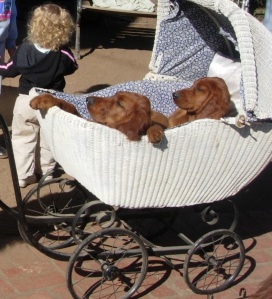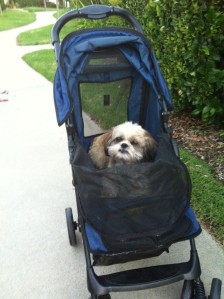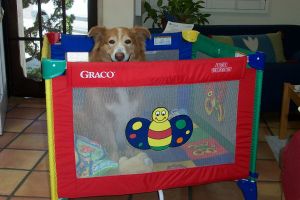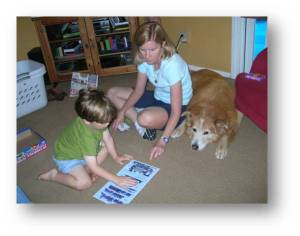Heads Up!…I’ve moved this blog to my new website: DogsandBabiesLearning.com. You can find this post and comments through mid-November here. If you are subscribing, commenting, linking or sharing, please do so from the new website.
Is Your Dog Your “First Baby?”
Cute puppy faces with those big eyes are irresistible. In fact, they actually ARE hard to resist because humans are biologically inclined to respond to baby-like faces. We get that “Aww, how cute!” feeling from a burst of oxytocin and it feels natural to be nurturing and protective. The bond is cemented when our dogs respond with affection and attachment of their own. It’s no wonder so many people in my classes express worry about how their dog might handle being displaced by a real baby.
After all, you hear so many stories of people who seemingly didn’t love their dogs as much or in the same way anymore once their babies were born. I remember that being one of my three biggest dog-related worries when I was pregnant the first time:
Am I not going to be a good “Dog Mom” anymore? Is it like getting struck by lightning and I won’t like my dogs? Why would anyone suddenly not want their dogs around? What if it happens to me? I love my dogs and I want to still love them. (But to get the full effect, you’d have to picture me following you around saying these things over and over again for months on end. Ask my husband – he can tell you how that was!)
Interestingly, I attended a talk just a few months ago by Patricia McConnell, noted animal behaviorist and author of many terrific training and behavior books, where she discussed research on the role of oxytocin and the love we share with our dogs. My mind started wandering to implications for new parents with dogs…
Oxytocin levels surge after giving birth and facilitate attachment between mother and baby. This is where you hear people say they felt overwhelming love the moment they laid eyes on their baby. (Although, in the interests of full disclosure, I have to say that I’m not a fan of childbirth and I was still too squeamish about the whole thing to feel that instant “magic” attraction. Happily, it’s not a prerequisite for loving your children!)
If your love for your dog is based primarily on a “baby” sort of attraction, you can see how it would pale in comparison to the real thing, especially when you are under the influence of super high oxytocin directing your affection towards the baby.
In fact, if you browse parenting discussion boards, you will see that it is not unheard of for new moms to confess to temporarily feeling differently about their older toddlers. All of a sudden, the noise, the dirt, the activity level, the whining, the pestering is in sharp contrast to the cute, helpless baby that holds you in thrall.
Mix in a string of sleepless nights and it’s hard not to be annoyed by everyone around you, human or canine. This is normal, but it’s not going to stay this way. Hormone levels go back to normal, sleeping patterns improve, everyone gets a grip and life goes on.
But, Where Does the Dog Fit in Now?
In many cases, the dog doesn’t seem to fit in at all. Parents are stretched thin, with everyone needing something from you all the time and, honestly, the dog can feel more like a nuisance than a joy. The thought may cross your mind, “My life would be easier without this dog…”
Jennifer Shryock of Dogs and Storks calls this the “Impulsive Rehoming Phase” to bring attention to the all-too-common situation where new parents temporarily lose perspective and can use some support to get to a stage where they can more clearly assess their options. She offers webinars and parent support that you can find here. I love that she’s giving this a name so no one feels like they are struggling on their own!
We don’t need to see any more dogs in shelters with the words “New Baby” written on the kennel card as reason for relinquishment.
In my experience, personally and with clients, the most effective solutions involve help for people and dogs. Planning ahead can make all the difference for your family.
Parents Are People, Too! (And Need Proper Care and Feeding!)
Even though it may seem like the dog’s issues are bringing you to a breaking point, it’s rarely just the dog. Usually, it’s a matter of being stretched to your limit in so many other ways that something has to give. You can’t send the baby back where he/she came from. You can’t get a divorce (too much paperwork – if you had time for all that paperwork, you’d have time to walk the dog).
Lack of sleep, crying baby, new family roles can all take a toll. Pay close attention to discussions of post partum depression in your childbirth classes and take note of resources in your area to support new parents.
Take advantage of your friends and family! No offer of help should go unused! It is really no big deal for people who have not just had a baby to do your grocery shopping, make meals, babysit, do laundry, hold your crying baby, take your dog for a walk, stuff some Kongs, etc.
Don’t suffer alone in a situation that seems untenable. It WILL get better, but maybe not as quickly without some help along the way. Don’t make a permanent decision about your best friend when you are not at your best.
Good News!! Your Dog Can Be So Much MORE Than Just Your “First Baby”
I hope this next part is encouraging for people who love their “spoiled” dogs. People are often a little embarrassed to admit their dog is spoiled but there’s always a big sigh of relief in class when everyone realizes they are not the only ones. I usually say it’s a GOOD thing to love another creature and want to make it happy – it’s good practice for being a parent!
The problem comes when the dog is left in the lurch – being the dependent “baby” isn’t an option anymore but the dog hasn’t been prepared for any other role. What else can such a dog do but pester and whine and be a nuisance? It’s not because he’s mean-spirited or “jealous” – it’s just that this is what he’s learned to do to get your attention and affection. The dog doesn’t know what else to do.
The good news is that there’s more to your wonderful dog than just a baby substitute. It’s not a matter of loving him less because he’s “just a dog” – it’s a matter of building up your dog so you can love him even more for all the things a dog can be as your companion in your new role as Mom or Dad.
You’ll all be happier when your baby can be your baby and your dog can be your dog. It’s not a step down or a loss of “status” — it’s the way things should be. In fact, for many months, you’ll probably be able to have a better conversation with your dog than your baby! Look forward to enjoying your dog’s companionship.
I have to say that I ended up loving my dogs MORE after I had kids. Didn’t think that was possible because I was pretty smitten with them, but, yet, that’s the way it happened.
For example, the novelty of breastfeeding wears off pretty quickly. Soon enough, no one is fluffing your pillow or bringing you water. It was just me going off with the baby yet again. But, my dogs! They came with me every single time. Sure, it looked like they were sighing and trudging down the hall, but they’d keep me company – as if they were there to bear witness to the changes in my life and assure me that they’d stick with me. It was very endearing.
Keep an eye out for ways that your dogs are trying. Trying to understand what’s going on. Trying to get you to look at them. Trying to fit in. Trying their best to be your companion as your needs are changing. In horse training, they say, “Find the try.” Same goes for dogs.
(I know this post doesn’t get into HOW to teach your dog the new behaviors you want so you can better enjoy his or her company, but if it did it would never be finished or would be so long it may as well be a chapter in my book project. A book I highly recommend is “Chill Out Fido” by Nan Arthur. Lots of nice step-by-step exercises you can do at home. Because, obviously, your dog isn’t going to be able to magically figure it out all by himself.)




Love this post! My child was a little on the high needs side and I SOOOO appreciated my dog… laid back, very low maintanence and mellow! Not to say we don’t have our challenges now, but in the first few months, my first baby/fur baby was far easier than the human variety.
By: Lindsey on August 20, 2011
at 2:50 am
I’ve said thank you before, but I’ll say it again and again! Your columns are wonderful and this one was so full of compassion and understanding. I work at a shelter and see this all the time. and it breaks my heart. I especially appreciated your advice on seeing how the dog is “trying”. So true!! Great work you are doing.
Gratefully,
Cathy Baier
By: Cathy Baier on August 18, 2011
at 10:37 am